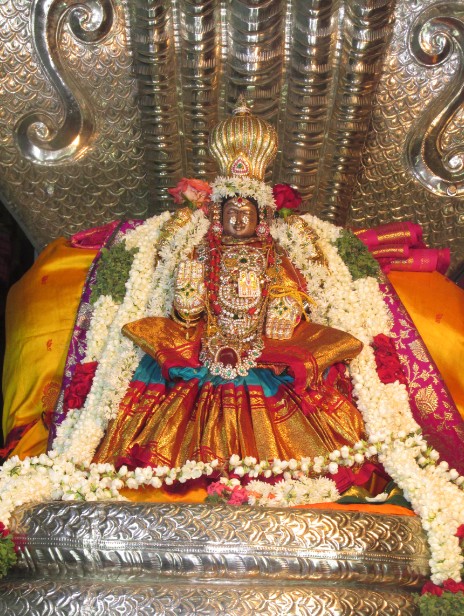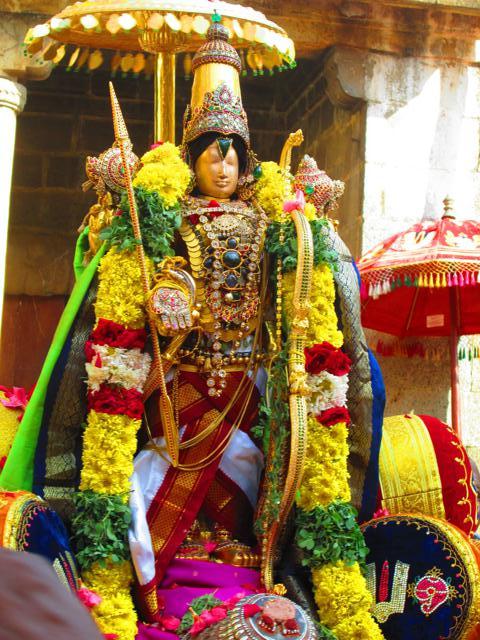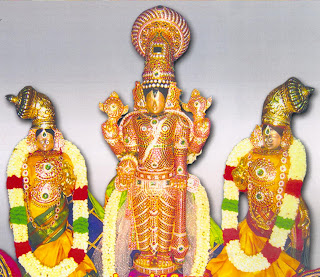dharma-samsthapanarthaya sambhavami yuge yuge The Lord appears for our benefit at various times. Thus He is now giving us a memorable Dharshan at this temple.Soundarya means beautiful and this can be witnessed here. Every organ and limb is beautiful. Specially for us He is appearing in Ratnangi or emerald embedded golden Armour.
patanti pitaro hy esam
lupta-pindodaka-kriyah
In such corrupt families, there is no offering of oblations of food and water to the ancestors.
Esam = these people, pitaro = forefathers, patanti = will fall upside down, lupta = without, pindodaka = food and water, kriyan = oblations.
“With the destruction of the dynasty, the deceased forefathers will not get the water and cooked rice offered in annual ceremonies and so they will fall from their position in Pithruloka upside down “ Here Arjuna says that since the forefathers are same for Duryodana and Pandavas, by fighting and killing Duryodana and others, the forefathers will be deprived of the oblations. Thus the need for doing one’s duties to one’s forefathers is emphasized here. Doing such rituals for one’s deceased parents, grand parents and further is very important. These deceased persons or Pithrus derive satisfaction when their progeny perform the specified ceremonies according to the custom of the families and so they bless them with happiness and prosperity. Alwar also says that such persons who perform their duties to their pithru get all happiness here in this world and in the upper worlds. One may wonder as how the udaka or the water and the pinda or the cooked rice made into a ball, offered in these ceremonies, can satisfy the deceased person who is not seen but is assumed to be somewhere. This does not appear to fit into this 21st century, one may think. Some call these as irrational or foolish beliefs. Yes, we should not do irrational things. But if we do not misinterpret the Vedas and do as prescribed in the shastras they will not be irrational. Annual or monthly ceremonies or those prescribed during Amavasya or done at Gaya or Badarinath or remembering our ancestors and bathing in sacred rivers, are all prescribed by shastras. So the pitru or ancestors appreciate anyone doing these. We need not think that the water and the rice are going to them. God only watches whether we are following His instructions.
One incidence in Mahabharatha will make this clear. Bheeshma, as well known, was a great person who performed all rituals as prescribed in shastras. His father was Santhanu and when Santhanu was alive, to please him to marry the boat man‘s daughter Matsyagandhi, he forsake the right to kingdom and also to avoid any of his successors claiming the kingdom, he made a oath not to get married and thereby getting the name Bheeshma. Naturally, the affection of his father was very great. After Santhanu’s death, when Bheeshma performed the rituals as prescribed in shastras, the deceased father wanted to take the pindam directly from Bheeshma to show his great affection and love. So during the ritual when the pinda was offered Santhanu’s hand emerged from the ground to accept the offerings. But as per the shastras the offerings are to be made to the ground only - bhoomena dattena pindena- and so Bheeshma refused to directly offer in the hands of his deceased father. So learned scholars and our ancestors were following what was ordered in the shastras, as that would please the God and, if He is pleased, we will lead a peaceful and happy life. So Arjuna refuses to deviate from the paths of elders by killing and destroying the dynasty.
(continued)



No comments:
Post a Comment